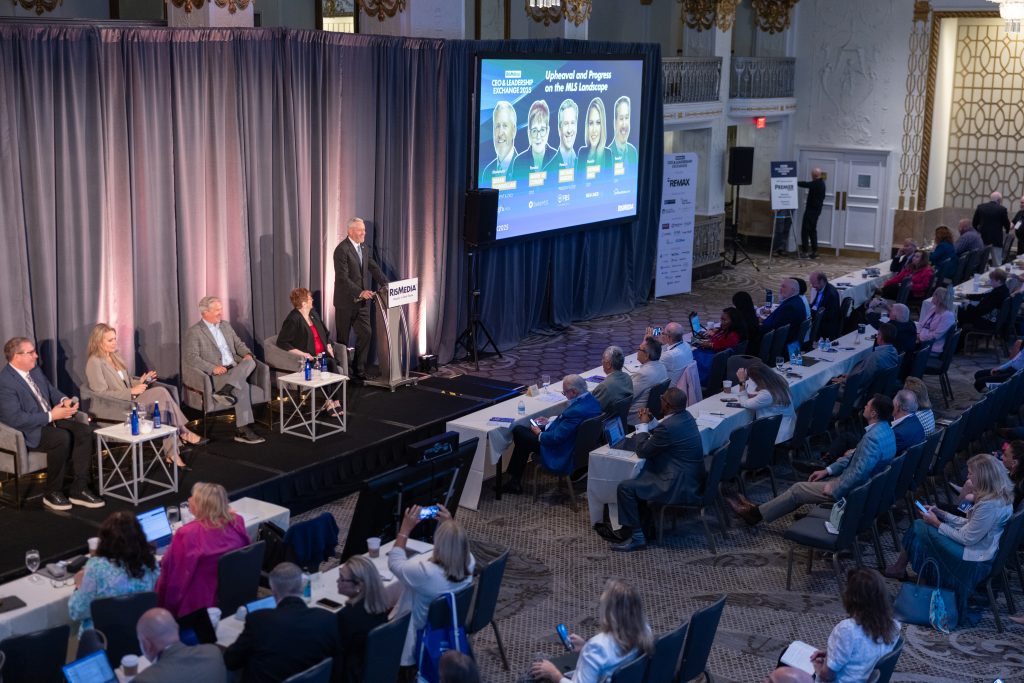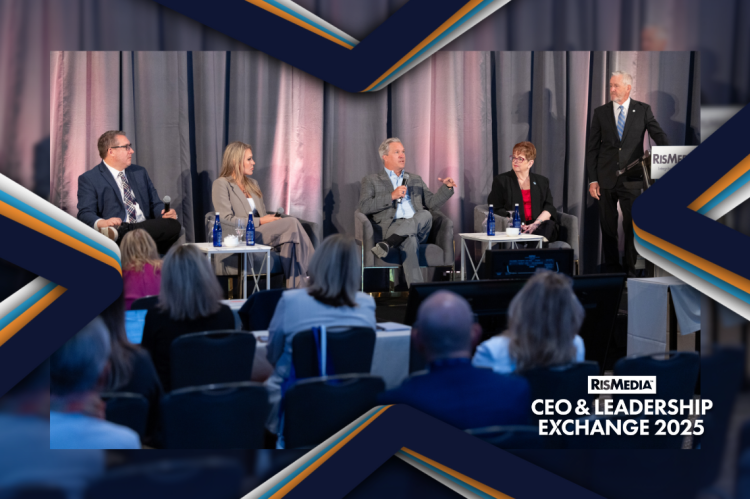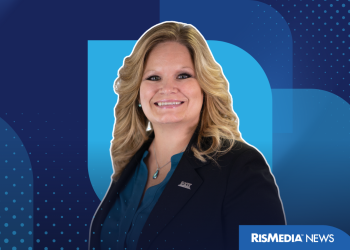Above, from left, Brad Bjelke, Dionna Hall, Michael Wurzer, Merri Jo Cowen and Brian Donnellan. Photo by AJ Canaria.
The MLS industry has faced some major shifts over the last couple of years, changing the landscape significantly and pushing for a lot of changes in how an MLS does business. The panel “Upheaval and Progress on the MLS Landscape’ at RISMedia’s recent CEO & Leadership Exchange, dove into this topic, covering the critical changes in the MLS landscape, and how MLSs are adapting to better serve members.
Moderated by Brian Donnellan, president and CEO of Bright MLS, panelists Merri Jo Cowen, CEO of Stellar MLS & UCO Global; Dionna Hall, CEO of Broward, Palm Beaches and St. Lucie REALTORS® and BeachesMLS; Brad Bjelke, CEO of UtahRealEstate.com; and Michael Wurzer, president and CEO of FBS, weighed in on the topic.
 Donnellan opened the discussion with the biggest change the MLS landscape has faced as of late: cooperation and compensation. The idea of cooperation has vastly shifted for MLSs following the NAR settlement, Donnellan noted. He posed the question of whether it’s optional or mandatory to be a successful MLS.
Donnellan opened the discussion with the biggest change the MLS landscape has faced as of late: cooperation and compensation. The idea of cooperation has vastly shifted for MLSs following the NAR settlement, Donnellan noted. He posed the question of whether it’s optional or mandatory to be a successful MLS.
Bjelke’s take on the matter was that he’s “looking at cooperation now as competition.”
“As an MLS, there’s no rule that you have to cooperate. We want people to cooperate and we have to earn their business. I think that the fun part for me running an MLS is that it now feels even more like a business where I can go out and compete against my neighbors.”
Bjelke expanded that in order to earn cooperation you now have to compete on “value and data accuracy.”
“Come to me for the best value, get the best service, get the best data that you can get, and I’m going to outperform my neighbors” he continued. “That’s my goal.”
Wurzer agreed, adding that “to make a market work, you bring in competitors.”
“Cooperation is the means by which you’re making that market work,” he continued.
On the other hand, Hall said she felt that cooperation is not dead, rather that “agents and brokers are valuing it more than they ever have before.”
“I think that what our industry has gone through for the past several years with these lawsuits has reinforced, especially with our brokers, that cooperation is more important than ever before,” she said. “It’s something that was taken for granted.”
Cowen agreed with this sentiment as well, adding that “cooperation to me is not optional.”
“The cooperation piece is the value. It’s about the data. It’s about all of the things that we can provide to help brokers and agents be successful, but without cooperation in the market, there’s no effect. It’s not effective,” she said.
Donnellan then transitioned the panel toward another hot topic in the MLS landscape: consolidation. He questioned panelists that as larger MLSs, do they feel we still need consolidation?
Bjelke opened the discussion by saying in his experience consolidation is still “one of the number one things that we look at day to day and how we can make it happen.”
“I think you disadvantage the brokers and the agents that are part of your MLS if they can’t easily access data across a wider area,” he said. “I love to see votes of consolidation. I think it would make our brokers’ lives easier, but I don’t think we should stop. We look for ways to service our brokers and agents to get them to a point where they have the data and the resources they need.”
Cowen agreed with Bjelke that “consolidation is necessary,” adding that it needs to continue as “some of the smaller MLSs don’t have the resources that they need to weather the storm.”
Hall also agreed with Bjelke that “consolidation is important” as it adds “a much easier marketplace for obviously our brokers and agents to transact in.” She also noted, however, that it’s “not always necessary in order to still achieve a very cohesive marketplace.”
Looking toward the future, Donnellan closed out the panel by asking in the next year or so what they are most excited about seeing/doing?
Wurzer noted that he’s observed a shift in data licensing from whether or not you are a participant to how you are using the data.
“I think that’s a shift that needs to happen and will really benefit the partnership between the brokers and the MLSs,” he said. “It will really benefit the brokers long term and allow MLSs to be much more innovative than they have been in the past.”
Bjelke said that he is excited about “where MLS and technology is going to go.”
“This is the commencement of something new. It’s going to be different for our agents. It’s going to be different for our brokers. It’s going to be different for us as an MLS, but I’m excited about how the opportunities are going to be there to morph into what the future is,” he said.
Cowen closed it out by noting that her excitement is about “property opportunities that we see to expand the marketplace. We are reaching out to do not necessarily data shares, but access to reciprocal access to two different systems across the country so that our agents and brokers can expand their horizons.”












